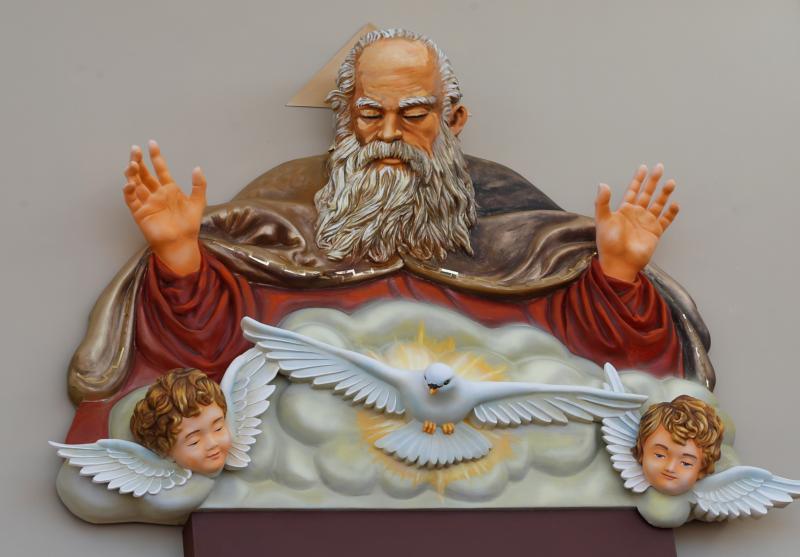
Artwork representing God the Father and the Holy Spirit decorates the altar area as Pope Francis celebrates Mass at the beach in Huanchaco, Peru. The liturgy of Pentecost includes one of the more striking medieval texts in the Roman Missal, “Veni Sancte Spiritus,” or “Come Holy Spirit.” (CNS photo/Paul Haring)
The first time I sensed the presence of the Holy Spirit, I was 4 years old.
It was late, much past my bedtime. I’d had a difficult time falling asleep. My room had been invaded by shadows, each growing more and more sinister by the headlights of passing cars.
I’d already called for my parents several times. The last time they came in to comfort me, they made it clear it would be the last time or there would be consequences. Once the door was closed, it wasn’t just shadows that frightened me. There was something there. Something awful.
[hotblock]
I remembered hearing at church that the Holy Spirit was called “The Great Comforter.” Knowing I couldn’t call my parents again, I began to pray. I told the Holy Spirit I was frightened. And there was something scary in my room, to please take it away and comfort me.
I was surprised to suddenly feel cold as it was summer, goosebumps spread from my wrists to my shoulders. Then it was as if a balloon expanded with air, displacing the frightening atmosphere I had felt in my room, until my entire room was overtaken with peace.
I knew my prayer had been answered. I fell asleep feeling calm and comforted.
This is how I met and understood the third person of the Trinity, years ago, as a small, scared, vulnerable child. I learned to call upon him ever since. I call when I am frightened or need his clarity and wisdom.
On Pentecost, we celebrate the arrival of the Holy Spirit to the disciples. Before Christ ascended into heaven, he told them his Spirit would arrive to comfort them. It is through the Holy Spirit that we experience God here, with us.
The liturgy of Pentecost includes one of the more striking medieval texts in the Roman Missal, “Veni Sancte Spiritus,” or “Come Holy Spirit.” The text is poetry. Its truth moves through my body as I read it, reacquainting me to the Holy Spirit. “Veni Sancte Spiritus” gives me new language to use as I call upon him. Through its words I learn more about who the Holy Spirit is and I learn to trust him.
“Come, Holy Spirit, come!/ And from your celestial home/ Shed a ray of light divine!”
In his First Letter to the Corinthians, St. Paul tells us that the gifts of the Holy Spirit include understanding and wisdom. We call upon the Holy Spirit to come from heaven, to bring his light, “shed a ray of light divine,” to enable us to see and understand the spiritual more clearly.
“You, of comforters the best;/ You, the soul’s most welcome guest;/ Sweet refreshment here below.”
[tower]
“The soul’s most welcome guest.” Isn’t he?
St. Paul writes in his Letter to the Romans that our very crying out, our longing for God, is the Spirit affirming that we are his children. We belong to him. When we sense his presence, we catch a glimpse of God’s glory, even if just for a moment. And what a refreshment that is to find comfort when we had none.
“O most blessed Light divine,/ Shine within these hearts of yours,/ And our inmost being fill!”
In the Acts of the Apostles, St. Paul says that in the Holy Spirit, “we live and move and have our being.” He fills us up and without the Holy Spirit we are hollow.
At Pentecost, we remember that first arrival of the Holy Spirit. The “Veni Sancte Spiritus” renews my understanding of the Holy Spirit, reminding me to call on him and he will be near.
***
Gonzalez is a freelance writer. Her website is www.shemaiahgonzalez.com.
PREVIOUS: Pains of divorce, cries of tots ring through church
NEXT: Forgiveness, the Holy Spirit’s gift to be given to others



Share this story